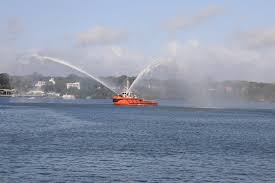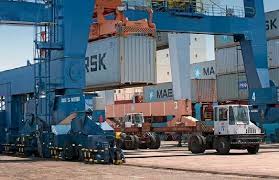Strengthening Regional Maritime Excellence Through Strategic Partnerships

Bandari Maritime Academy Students on Work Study Tour at Comarco Port Terminal.(Photo/Courtesy)
By Andrew Mwangura
Email, thecoastnewspaper@gmail.com
The recent benchmarking visit by Bandari Maritime Academy (BMA) leadership to the Tanzania Shipping Agencies Corporation (TASAC) headquarters in Dar es Salaam represents more than a routine institutional exchange. Under the leadership of Chief Executive Officer Dr. Eric Katana, this strategic engagement signals BMA’s unwavering commitment to transforming maritime education across East Africa through meaningful partnerships that transcend national boundaries.
The warm reception by TASAC Assistant Human Resources Officer Happiness Greta Isaac, representing Director General Mohamed Malick Salum, demonstrates the mutual recognition of shared objectives between these two maritime institutions. This collaborative spirit reflects a mature understanding that the challenges facing the maritime sector in our region require coordinated responses that leverage collective expertise and resources.
For BMA, this initiative carries profound importance that extends far beyond the immediate benefits of knowledge sharing.
The Academy has consistently positioned itself as a regional leader in maritime education, but maintaining this status in an increasingly competitive global maritime environment demands continuous evolution and adaptation.
Through strategic partnerships like the one being forged with TASAC, BMA strengthens its institutional capacity while ensuring its training programs remain aligned with international maritime conventions and industry best practices.
The significance of this benchmarking tour lies in its potential to address critical gaps in regional maritime education and training.
By exploring areas of mutual benefit including curriculum development, exchange programmes, regulatory alignment, and professional certification, both institutions are laying the groundwork for a more integrated approach to maritime education across East Africa.
This integration is essential for creating a workforce that can seamlessly operate across regional boundaries while meeting the demanding standards of the international maritime industry.
The timing of this partnership is particularly strategic, as the Blue Economy continues to gain prominence as a key driver of economic growth in coastal African nations.
The maritime sector’s contribution to regional economies extends far beyond traditional shipping and port operations to encompass fisheries, marine tourism, offshore energy, and marine biotechnology. BMA’s engagement with TASAC positions the Academy to better prepare graduates for this expanding economic landscape while ensuring that training programs reflect the evolving needs of the Blue Economy.
Furthermore, this collaboration addresses the critical need for standardized professional certification across the region.

Maritime professionals often work across multiple countries, and inconsistent certification standards can create barriers to mobility and career advancement. Through regulatory alignment initiatives emerging from partnerships like this one, BMA contributes to creating a more cohesive regional maritime labor market that benefits both professionals and employers.
The broader strategic implications of this partnership extend to BMA’s mission as a Centre of Excellence in Maritime, Shipping, and Blue Economy training.
Excellence in education is not achieved in isolation but through continuous learning, benchmarking, and adaptation. By engaging with established institutions like TASAC, BMA demonstrates its commitment to learning from diverse experiences and incorporating best practices into its operations.
This benchmarking approach also reflects a sophisticated understanding of institutional development in the maritime sector. Rather than attempting to develop solutions in isolation, BMA is building a network of partnerships that create opportunities for shared learning, resource optimization, and collaborative problem-solving. Such networks are essential for smaller institutions to compete effectively with larger, better-resourced maritime academies in other regions.
The potential for exchange programmes emerging from this partnership offers particular promise for enhancing the quality of maritime education.
Students and faculty who experience different institutional environments return with broader perspectives and enhanced capabilities that benefit the entire Academy community. These exchanges also create lasting professional networks that can facilitate future collaboration and career development.
As BMA continues to forge strategic partnerships across the region, this initiative with TASAC serves as a model for how maritime institutions can work together to elevate standards while maintaining their unique institutional identities.

The success of this partnership will likely influence BMA’s approach to future collaborations and contribute to the Academy’s long-term sustainability as a regional leader in maritime education.
The true measure of this partnership’s success will be seen in the enhanced capabilities of maritime professionals graduating from both institutions and their ability to contribute meaningfully to the region’s maritime and Blue Economy development. Through strategic collaboration, BMA and TASAC are not merely sharing knowledge but actively shaping the future of maritime education in East Africa.
The author is a policy analyst specializing in maritime governance and blue economy development.






